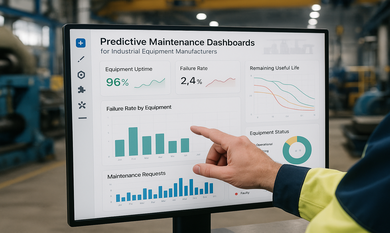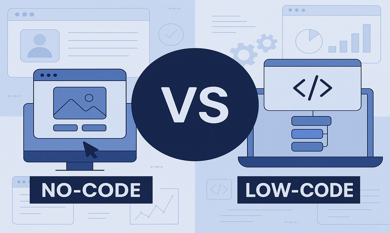The logistics sector is one of the most critical industries in the global economy, ensuring the timely movement of goods and materials across vast distances. As the demand for quicker deliveries and efficient supply chains increases, so does the need to ensure driver safety and regulatory compliance. One of the most effective ways to enhance safety and compliance in this fast-paced sector is through the use of web applications. Web apps have revolutionized how logistics companies manage fleets, monitor drivers, and ensure adherence to industry regulations. These solutions are not only improving operational efficiency but also safeguarding the well-being of drivers.
In this article, we’ll explore how web apps are reshaping driver safety and compliance in the logistics sector, and why investing in custom web applications is crucial for companies aiming to thrive in this space.
1. Real-Time Monitoring for Driver Safety
One of the most significant advancements brought by web apps in the logistics sector is the ability to monitor drivers in real-time. Web applications allow logistics companies to track key metrics such as vehicle speed, location, and driving behavior. This data is invaluable for identifying unsafe driving practices, such as excessive speeding, harsh braking, or erratic driving, which can put drivers and cargo at risk.
By integrating these web apps with sensors and GPS systems, logistics companies can provide drivers with instant feedback to correct unsafe behavior. For instance, if a driver exceeds the speed limit, the system can automatically send an alert to both the driver and the fleet manager. This proactive approach allows companies to address safety issues before they lead to accidents.
Investing in web app development services Dallas can provide logistics companies with customized solutions that are tailored to meet the specific safety needs of their drivers. These apps can be designed to deliver real-time alerts, generate detailed reports on driver performance, and even predict potential hazards based on historical data.
2. Ensuring Compliance with Industry Regulations
The logistics industry is heavily regulated, with strict rules governing driver working hours, vehicle maintenance, and cargo handling. Failure to comply with these regulations can lead to fines, accidents, and reputational damage. Web applications are playing a crucial role in helping logistics companies maintain compliance with industry standards.
For example, web apps can automatically log a driver’s hours of service, ensuring that they do not exceed the legally mandated driving time. These apps can also generate reports that show whether drivers have taken the required rest breaks and are operating within safe driving limits. By keeping digital records, companies can easily demonstrate compliance during audits or inspections.
Furthermore, web apps can assist in vehicle maintenance scheduling, ensuring that vehicles are regularly serviced and in optimal condition. This reduces the likelihood of mechanical failures, which can compromise safety and lead to compliance violations. For logistics companies looking to streamline their compliance processes, web app development services Dallas can offer tailored solutions that ensure full adherence to industry regulations while minimizing administrative burdens.
3. Enhancing Driver Communication and Support with Chatbots
In the logistics sector, clear and effective communication between drivers and fleet managers is essential for both safety and efficiency. Web apps integrated with chatbots are becoming an increasingly popular solution for facilitating communication. Chatbots can provide instant support to drivers on the road, answering common questions, providing updates on routes, or alerting drivers to potential hazards.
For instance, a chatbot can assist a driver who is unsure of the best route to take by offering real-time traffic updates and alternative routes. It can also alert drivers to changing weather conditions that may affect safety. In addition, chatbots can help drivers with routine compliance tasks, such as filling out logs or checking vehicle maintenance schedules.
By investing in chatbot development services, logistics companies can automate routine communications and provide drivers with immediate access to critical information. This reduces the need for back-and-forth calls with dispatchers, allowing drivers to stay focused on the road. Chatbots can also be programmed to escalate serious issues to human operators when necessary, ensuring that drivers receive the support they need at all times.
4. Preventing Driver Fatigue Through Web Apps
Driver fatigue is a significant safety concern in the logistics industry. Long hours on the road can lead to reduced concentration and slower reaction times, increasing the risk of accidents. Web apps can play a vital role in preventing driver fatigue by monitoring driving hours and providing real-time alerts when it’s time for a break.
Some web apps are designed to work with wearable devices that track drivers' physical conditions, such as heart rate and alertness levels. If the system detects signs of fatigue, such as prolonged drowsiness or reduced alertness, it can notify the driver to pull over and rest. These tools help ensure that drivers are well-rested and fully alert, reducing the likelihood of fatigue-related incidents.
By partnering with web app development services Dallas, logistics companies can create custom applications that monitor and manage driver fatigue, ensuring that safety is always a top priority. These apps can be further integrated with the company’s broader fleet management system, providing comprehensive oversight of driver safety.
5. Accident Reporting and Analysis
Accidents can still happen, even with the best safety measures in place. When they do, web apps can simplify the process of reporting and analyzing the incident. Drivers can use mobile-enabled web apps to immediately report an accident, upload photos, and provide real-time updates on the situation. This allows fleet managers to respond quickly and take the necessary steps to manage the incident.
Web apps can also analyze data from accidents to identify patterns and causes, helping companies implement corrective measures to prevent future incidents. Whether it’s adjusting driver training or updating safety protocols, these insights are invaluable for continuous improvement.
Conclusion
The logistics sector is at the forefront of innovation, with web apps playing an increasingly critical role in enhancing driver safety and ensuring compliance with industry regulations. From real-time monitoring and fatigue management to chatbot-enabled communication and accident reporting, web apps are transforming how logistics companies operate and prioritize safety.
As the industry continues to evolve, investing in customized web applications is essential for companies that want to stay competitive. For logistics companies in need of cutting-edge solutions, Theta Technolabs provides expert web app development services Dallas that meet the unique challenges of the logistics sector. Whether it’s creating driver monitoring systems or integrating chatbot support, Theta Technolabs has the expertise to deliver innovative solutions that keep drivers safe and operations running smoothly.



_Hero_Enhancing%20Driver%20Safety%20and%20Compliance%20with%20Web%20Apps%20in%20the%20Logistics%20Sector_Q3_24.jpg)


















_Choosing%20the%20Right%20App%20Development%20Company_%20A%20Comprehensive%20Guide_Q1_24.jpg)
_Chatbots%20for%20Event%20Management%20and%20Hospitality%20Services_Q1_24.jpg)
_Best%20iOS%20App%20Development%20Company_%20Enhancing%20User%20Engagement%20with%20Push%20Notifications_Q2_24.jpg)
_Key%20Trends%20in%20Healthcare%20Software%20Development%20for%20the%20Future_Q2_24.jpg)
_How%20much%20does%20it%20cost%20to%20create%20an%20android%20app%20in%202024%20for%20Startups_%20A%20detailed%20guide_Q2_24.jpg)
_Integrating%20Chatbots%20Into%20Your%20Application.jpg)


_Enhancing%20Driver%20Safety%20and%20Compliance%20with%20Web%20Apps%20in%20the%20Logistics%20Sector_Q3_24.jpg)
_Web%20Apps%20for%20Retail%20and%20eCommerce_%20Streamlining%20Operations%20and%20Reducing%20Costs_Q3_24.jpg)
_How%20AI%20is%20Enhancing%20Construction%20Site%20Surveillance%20and%20Security%20in%20Dallas_Q3_24-1.jpg)
_The%20Impact%20of%20Cross-Platform%20Apps%20on%20Real%20Estate%20Market%20Trends%20in%20Dallas_Q3_24-1.jpg)
_Streamlining%20Appointment%20Scheduling%20with%20Cloud%20Computing%20in%20Dallas%20Healthcare_Q4_25.jpg)
_How%20Cloud%20Solutions%20Are%20Enhancing%20Remote%20Patient%20Monitoring%20in%20Healthcare_Q4_25.jpg)































.png)












.png)

.png)
.png)
.png)
.png)


.png)
.png)
.png)

.png)






.png)
.png)

























